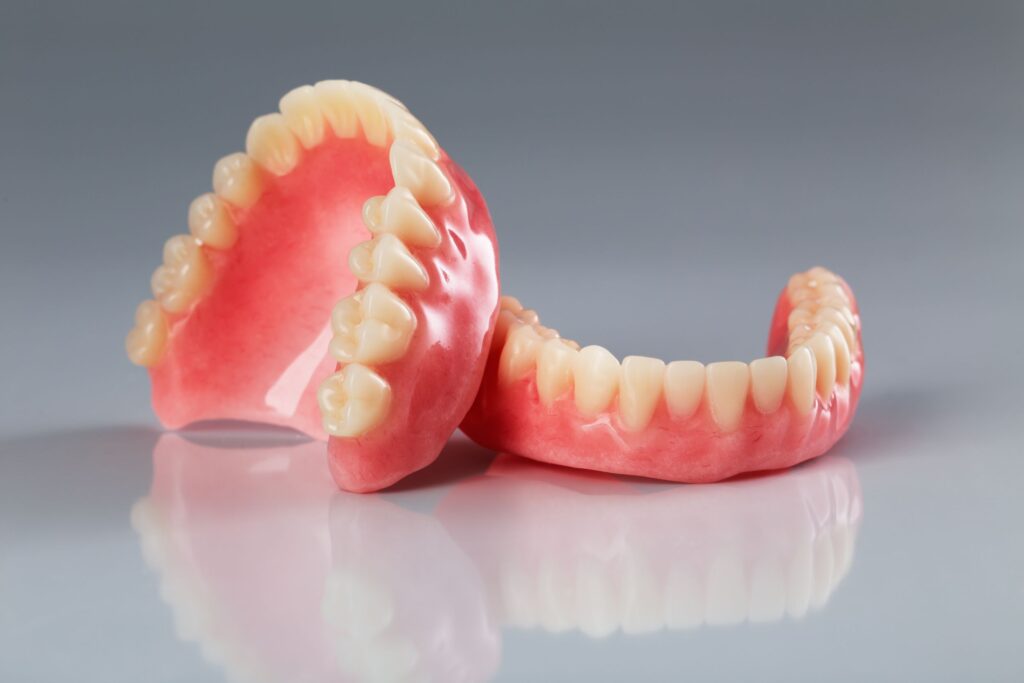
Tooth loss can detract from your quality of life in many ways. For instance, the sudden changes in your smile can leave you feeling overly self-conscious about the way you look, which can lead to anxiety. On top of that, you rely on a full set of teeth to enunciate words and thoroughly chew your food.
Thankfully, your dentist can provide lifelike dentures to restore your grin’s appearance and functionality. However, did you know that people with these artificial teeth are more likely to become malnourished despite their many benefits? Continue reading to learn why this happens, and how you can preserve your health!
How Do Dentures Improve My Bite?
When teeth go missing, it’s much harder to eat a variety of ingredients to give your body all the nutrients it needs. Some patients become malnourished because they try to stick to soft foods that usually don’t contain as many beneficial vitamins and minerals.
Fortunately, dentures can return about 20% to 25% of your original bite force so that you can enjoy a wider selection. That said, these restorations are notorious for coming loose, so many patients still struggle to chew with them. These prosthetics rely on a firm bond against the gum tissue over the bony ridges in your mouth to remain in place. They can lose suction when you bite into something and become dislodged.
How Do Dentures Impact Nutrition?
It’s easy to assume that wearing dentures will inevitably improve your health, but researchers have found that’s not always true. For instance, one scientific experiment compared the medical labs of patients two years before getting artificial teeth and two years after. They surprisingly found a significant decline in specific nutrition markers after being fitted with dentures. But why did this happen?
Many people think about their stomach and intestines when they think about digestion, but the process actually starts in your mouth. After you take a bite of your meal, saliva immediately moistens your food and begins breaking down carbohydrates to be used for energy. If you’re trying to chew with loose dentures, you might grow impatient and swallow overly large pieces before you’re finished grinding them. You can develop gastrointestinal issues as your gut tries to overcompensate on top of malnutrition because it’s less able to absorb valuable nutrients.
How Can Implant Dentures Help?
It’s not uncommon for patients to struggle with ill-fitting prosthetics. If you’re eagerly seeking a more reliable restoration, you might benefit from implant dentures. This method involves strategically placing several titanium rods into your jawbone that will attach to a new set of artificial teeth. Because the metal fuses with your jaw, this is a permanent solution that restores more of your chewing ability. Implants are stronger and more resilient than traditional dentures, so fewer dietary restrictions exist. Plus, you’re able to sufficiently mash up your meal to be swallowed.
With implant dentures, you can enjoy all your favorite meals without worrying about your digestion!
About the Practice
At Legacy Trails Dental of Plano, you and your family benefit from two dentists who work together to offer a full array of services conveniently under one roof. Dr. Azmoodeh and Dr. Romanoff have 20+ years of combined experience and are comfortable treating people of all ages. They prioritize patient care and take the time to get to know your dental history, concerns, and goals. Then, they utilize state-of-the-art technology to provide individualized treatments with accurate results. If you’re interested in upgrading your dentures, you can request an appointment on the website or call (214) 227-1000.
